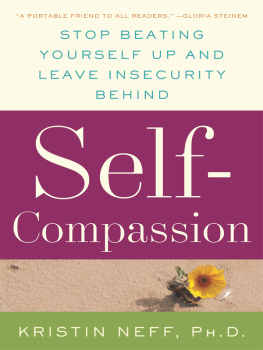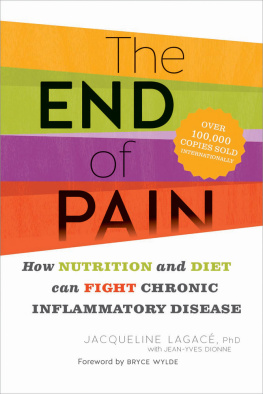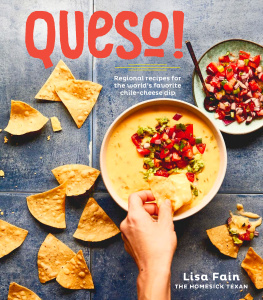Jean Fain - The Self-Compassion Diet
Here you can read online Jean Fain - The Self-Compassion Diet full text of the book (entire story) in english for free. Download pdf and epub, get meaning, cover and reviews about this ebook. year: 2011, publisher: Sounds True Inc, genre: Romance novel. Description of the work, (preface) as well as reviews are available. Best literature library LitArk.com created for fans of good reading and offers a wide selection of genres:
Romance novel
Science fiction
Adventure
Detective
Science
History
Home and family
Prose
Art
Politics
Computer
Non-fiction
Religion
Business
Children
Humor
Choose a favorite category and find really read worthwhile books. Enjoy immersion in the world of imagination, feel the emotions of the characters or learn something new for yourself, make an fascinating discovery.
- Book:The Self-Compassion Diet
- Author:
- Publisher:Sounds True Inc
- Genre:
- Year:2011
- Rating:3 / 5
- Favourites:Add to favourites
- Your mark:
- 60
- 1
- 2
- 3
- 4
- 5
The Self-Compassion Diet: summary, description and annotation
We offer to read an annotation, description, summary or preface (depends on what the author of the book "The Self-Compassion Diet" wrote himself). If you haven't found the necessary information about the book — write in the comments, we will try to find it.
The Self-Compassion Diet — read online for free the complete book (whole text) full work
Below is the text of the book, divided by pages. System saving the place of the last page read, allows you to conveniently read the book "The Self-Compassion Diet" online for free, without having to search again every time where you left off. Put a bookmark, and you can go to the page where you finished reading at any time.
Font size:
Interval:
Bookmark:
PART I
PART IV
Most people dont want to believe that when it comes to permanent weight loss, you gotta have social support. Whether that support comes from a diet club, therapy group, health-care institution, or a small circle of friends, you need some number of somebodies behind you. Or at least one weight-loss buddy.
I nod knowingly when new clients tell me they would prefer to avoid scrutiny and embarrassment by keeping their weight-loss efforts secret. I understand. I used to shy away from support groups myself. Although, like many clients, I wouldnt have been caught dead at a Weight Watchers meeting, I had no problem following the diet on my own. (That is, for the week or two I could stick to it.)
Because I do understand, I dont lecture clients on the measurable difference social support makes to health, happiness, and habit change. Nor do I insist they join a weight-loss group. Instead, I review the optionsfamiliar self-help groups like Overeaters Anonymous, commercial organizations such as Weight Watchers, as well as less familiar options in the community and on the Internetincluding therapy groups, restaurant-based slimming clubs, diet-betting websites (where dieters can bet on their future success), and chat rooms. You know, those real-time online coffee klatches.
I also share stories and recommend reading on the transformative power of social support. One such book is Pack of Two by the late author Caroline Knapp.[1] After a long, lonely battle with anorexia and alcoholism, Knapp found inner strength with the help of her beloved dog Lucy and Alcoholics Anonymous, among other supports. Only when clients are ready do I encourage them to find strength and compassion in numbers.
That said, I will encourage you to dive into this chapter. I realize that social support doesnt have the magical allure of hypnosis, the Eastern appeal of meditation, the je ne sais quoi of self-compassion. The phrase social support has more of an off-putting effect. Just the word support, for many veteran dieters, has become synonymous with social awkwardness, public humiliation, and certain failure. I will tell you, however, that what youre about to learn will expand the idea of social support, if not challenge long-standing assumptions and lead to new, unexpected conclusions.
I will also introduce you to community members who have succeeded beyond their wildest weight-loss dreams. Like Alex, an obese businessman who lost 160 pounds, halving his body weight, with a lot of help from his friends. It isnt that much of a surprise, considering what scientific minds have discovered about unified efforts. Are you aware, for example, that group therapy produces greater weight loss than individual therapy, even among clients who say they prefer the undivided attention of an individual therapist? Weight loss, researchers have reason to believe, is positively contagious. Their eye-opening research findings are the kind that inspire waist watchers to buy memberships and other impulse purchases they will never use. Best to slow down long enough to learn basic concepts, the best options. The lingo, too.
There are lots of definitions of social support, and many have to do with who you gonna call in a crisis? Who is going to catch you when you fall on physical, emotional, or financial hard times? While the friends and family who make up your human safety net can be lifesavers, they cant necessarily save you from overdosing on pepperoni pizza. In fact, some of your best allies in a life catastrophe can be your worst enemies in your personal weight-loss battle.
So who you gonna call for weight-loss support? Jenny Craig? Your partner in overeating? Fido? If the very question inspires more despair than hope, youve got plenty of company. Even clients who long for community have been known to respond to the who-you-gonna-call question with some variation of Id rather do it myself. Theres ample reason why waist watchers fail to embrace support groups. If youve had negative experiences, youve probably got a few reasons of your own. If your experience was particularly painful, you might be asking yourself the question that rugged individualists like author Ayn Rand made their name asking: Collective effort, what is it good for? Its a good question. I encourage you to keep it in mind as you read on.
Generally, the term social support refers to people helping people. More specifically, theres positive social support, a conscious and generous act committed by those who encourage others to meet goals. Theres also negative support, that thing some people do, often subconsciously, when they discourage healthy change. Like when someone buys a waist watcher the very snack shes sworn off, or insists on eating the sworn-off snack in her company.
Social support is a measurable concept with quantifiable benefits. Researchers have developed standardized tests to assess the quantity (how many people) and quality (how personally satisfying) of an individuals support system. (Quality, more than quantity, is a stronger predictor of good things to come.) With these scales, countless researchers have counted the ways social support benefits the health and well-being of such diverse populations as pregnant women, breast cancer survivors, diabetics, cardiac patients, and yes, waist watchers.[2] Whether or not you agree with Barbra Streisandthat people who need people are the luckiest peopletheres much to be gained by assessing your support network, then strengthening it if need be. (In the next chapter, you will get the chance to assess the strength of your current network.)
For now, its worth remembering that you are no stranger to support. You started this life in groups (family, school, church), and you live as well as you do because of various collective efforts (community, work, government). We are undeniably social creatures, and we generally do better when we are surrounded by a herd of creatures who love, support, and encourage us.
From day one of human history, social support has proven enormously helpful. First and foremost, for survival. In the beginning, early men and women banded together to hunt, gather, and ward off wooly mammoths. Centuries later, when our primitive predecessors moved into town and got more civilized, they worked shoulder to shoulder on higher purposes, like liberty, justice, and human welfare. But it wasnt until the twentieth century that groups purposefully gathered for therapeutic purposes.
Historians single out a Boston doctor named Joseph Pratt as the innovator of group therapy. With tuberculosis cases on the rise back in 1905, it made good, practical sense for Pratt to teach his TB patients about the deadly disease en masse. But the idea of therapy groups had been brewing since the late 1800s, when settlement houses were founded to help Americas burgeoning immigrant population find work and shelter. Another turn-of-last-century health-care provider who gets a nod for prescribing the talking cure collectively is a disciple of Sigmund Freuds, Alfred Adler. Unlike Freud, who understood psychological problems to reside in an individuals psyche, Adlers understanding of psychic pain took into account his patients social circles.
To be fair, credit for group therapys skyrocketing popularity belongs to a number of health professionals, notably Irvin Yalom, the psychiatrist and group-therapy scholar, and Aaron Beck, the forefather of cognitive therapy. Nonprofessionals, too: two names that stand out are Bill Wilson, cofounder of Alcoholics Anonymous, and Jean Nidetch, innovator of Weight Watchers.
Font size:
Interval:
Bookmark:
Similar books «The Self-Compassion Diet»
Look at similar books to The Self-Compassion Diet. We have selected literature similar in name and meaning in the hope of providing readers with more options to find new, interesting, not yet read works.
Discussion, reviews of the book The Self-Compassion Diet and just readers' own opinions. Leave your comments, write what you think about the work, its meaning or the main characters. Specify what exactly you liked and what you didn't like, and why you think so.










![Yakov Fain [Yakov Fain] - Java Programming 24-Hour Trainer, 2nd Edition](/uploads/posts/book/119348/thumbs/yakov-fain-yakov-fain-java-programming-24-hour.jpg)
